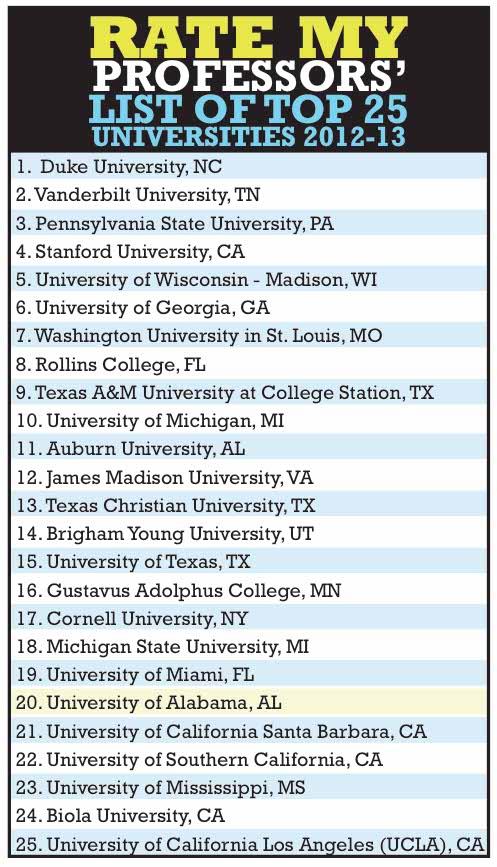 So far this year, The University of Alabama has been ranked as #86 in National Universities, according to the US News & World Report; #1 in all applicable college football polls listed on ESPN; and, more recently, #20 in RateMyProfessors.com’s Top Schools list.
So far this year, The University of Alabama has been ranked as #86 in National Universities, according to the US News & World Report; #1 in all applicable college football polls listed on ESPN; and, more recently, #20 in RateMyProfessors.com’s Top Schools list.
This year was the first year the University appeared on the list, which has been compiled for the past four years by RateMyProfessors.com, an online platform where students can anonymously and widely comment on professors they have had.
“Users play a crucial part in moderating the site, as they really recognize value in the tool and make sure ratings remain accurate,” Jake Urbanski, MTV communications manager, said in an email statement.
MtvU acquired the website in 2007 to extend its reach as a resource.
“Here at MTV, we had been hearing about RMP for a long time and thought it was a smart, organic site that was a useful tool for college students,” Urbanski said. “Just like mtvU, the site was built for college students, by college students.”
According to 114 reviews on RateMyProfessors.com, Criminal Justice instructor Douglas Klutz is not only helpful and clear, but also “hot.” He has the second highest number of reviews and the highest possible score for overall quality – a 5.0.
“I have taken Mr. Klutz for two classes now, the intro class and a special topics class,” one reviewer wrote. “He is one of the sweetest and most caring teachers I have had. He really wants you to do well in class and always teaches about interesting and important subjects that impact our life. Highly recommend that anyone takes at least one of his classes.”
Klutz said the feedback, along with Student Opinion of Instruction forms provided by the University, is useful for helping him make adjustments.
“I definitely think faculty members should look at what’s going on on RateMyProfessors to see what the general consensus with students is,” Klutz said. “At the same time, the SOIs are more official in that you know exactly where they’re coming from. I think you should use both.”
For students, Klutz said, the site is useful for getting a general consensus, as well as for gaining insight into the class structure. But since reviewers tend to either strongly like or dislike their professors, he said it was important to see how many reviews a professor has before using the site.
“There’s not much middle ground on RateMyProfessors and I think that’s the biggest faculty complaint overall,” he said. “I think it’s a good baseline to go by.”
Jacob Miles, a junior majoring in chemical engineering, has contributed to RateMyProfessors.com but said he only posted reviews for professors he strongly liked or disliked.
For professors he disliked, he said he wants to communicate his concerns to the professor, and for professors he liked, he wants to encourage other students to take the class.
“For the majority of them, it’s enough to just do the SOIs,” he said.
In fact, Miles said his reviews are often nearly identical to his SOIs. Still, he encourages professors to at least look at their RateMyProfessors reviews because he believe students are more likely to be open.
“It would be a different perspective for the professors to look at it,” he said.
He said he thought The University of Alabama deserved its top-25 ranking.
“I have no clue why we haven’t been before,” he said. “I don’t think anything’s changed this year compared to last year.”
Klutz said an administrative emphasis on student-centered objectives and SOI feedback may explain the new ranking.
“They can’t force us to do it, but hopefully it means a lot of faculty members are taking it seriously. If they’re making changes accordingly, they’re making their classes better overall…[leading to] more positive ratings on RateMyProfessors.”









